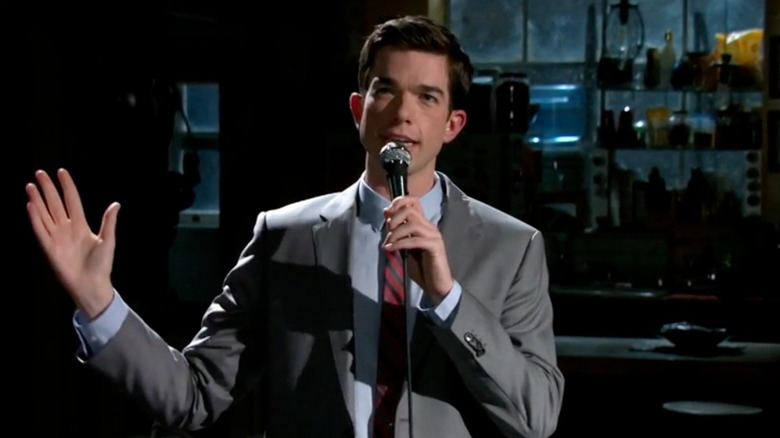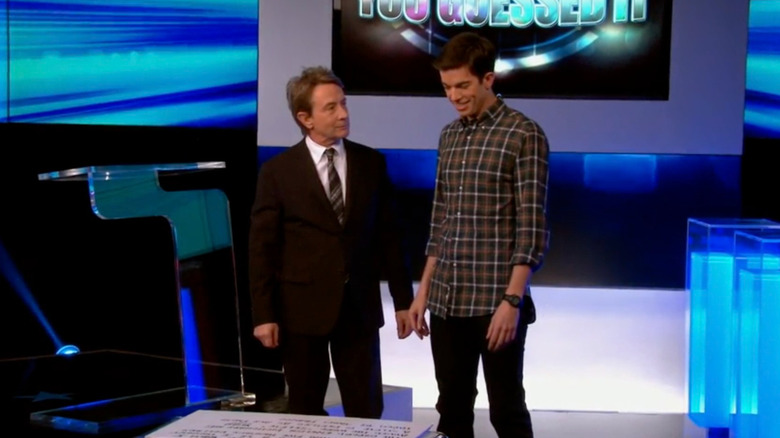John Mulaney's Forgotten Sitcom Was A Critical And Commercial Failure
It shouldn't come as a surprise to anyone that John Mulaney is one of the funniest comedians working today. His material possesses a sharp wit that's only matched by his theatrical showmanship. Mulaney knows how to play to a crowd and, even better, subvert their expectations when it comes to delivering a great punchline. Some of his best jokes often involve him going on about a subject only he really cares about, and ultimately winning folks over to his side. It's even funnier when the joke is mostly to make himself laugh. As of late, the Emmy-award winning comedian is doing incredible work for Netflix with "Everybody's Live With John Mulaney."
It's one of the best late night talks shows on television simply because it's the only place where you can see Bonnie Aarons garbed in her full "Mulholland Drive" makeup simply for a throwaway gag.
Mulaney occupied the 2010s as one of the most prominent comedic talents of his generation. In addition to writing over 94 episodes of "Saturday Night Live," he was blowing up on the stand-up scene with specials like "New in Town" and "The Comeback Kid." Here was a fresh young talent with charm for days and knew how to put on a good show. It was only a matter of time until he took a stab at his own television show, and in 2013, he got his chance with the short-lived Fox sitcom entitled "Mulaney."
It doesn't exactly sound like a bad idea in concept. After all, Bob Newhart, Bernie Mac, Ray Romano and Jerry Seinfeld were all comedians that translated their stand-up material to their respective shows with incredible success. But it was clear that "Mulaney" didn't have what it takes to become one of the great comedian-led sitcoms.
Mulaney drew glaring comparisons to Seinfeld
"Mulaney" premiered on Fox in October 2014 to widely negative reception. It currently sits at 17% on Rotten Tomatoes, with the audience score not faring much better either at 41%. The semi-autobiographical series followed Mulaney as a fictionalized version of himself, as he tries to make a living as a comedian in New York City. He's surrounded by an eccentric cast of characters including his college friend/roommate Jane (Nasim Pedrad), comedian friend/roommate Motif (Seaton Smith), drug dealer confidant Andre (Zack Pearlman), wise neighbor Oscar (Elliott Gould), and comedian/game show host boss Lou Cannon (Martin Short).
Throughout an episode, Mulaney would sprinkle in bits of his stand-up material. If that idea sounds familiar, then it should come as no surprise that a lot of the show's criticisms from critics and audiences stemmed from Mulaney's failed attempt to follow in the footsteps of "Seinfeld." The series follows a similar loose structure of a comedian uncovering their material while living in New York. I'm sure reception would have been warmer if "Mulaney" was consistently funny, but there were very few willing to go to bat for it, barring critics like The Atlantic's David Sims, who believed viewers were sleeping on its potential. It appeared that viewers weren't willing to invest in Mulaney's goodwill as the series' ratings were dwindling, which led to its ultimate cancellation in February 2015 after airing only 13 episodes.
I think part of the reason why it faltered is because Mulaney's material is very theatrical and plays better when he's catering to an auditorium of people. There's an irony to that, considering "Mulaney" was shot in front of a live studio audience. It's jarring, however, to see the titular comedian doing some of his watered down routines to then embody a character that mostly speaks as if he's still doing his bit. But even "Seinfeld" knew Jerry couldn't be in stand-up mode all the time.
It's not quite as bad as its reputation would suggest, mostly because Mulaney is a captivating presence that can stealthily land a good joke every now and then. Add Martin Short as an unpredictable game show comedian and the jokes write themselves. You can see some promise in "Mulaney" partly because the series started out as something much more personal.
Mulaney originated over at NBC, but the network passed
When the short-lived series was still in the development stages, Mulaney initially had the project housed at NBC. It makes sense considering he was still a writer on "SNL" and Lorne Michaels was attached as an executive producer. Mulaney talks about how the initial hook of the show emanated from his early 20s, where he focused on finding himself amid his sobriety (via Decider):
"There was another version at NBC called 'Mulaney Don't Drink,' which was about me getting sober at 23; It was based on the time in my life when I got sober at 24 and had two roommates and was just trying to figure out: What does a good person do? That was an actual part of my life, or a pointless gauntlet I threw down in front of myself."
It appeared NBC wasn't too keen on that element of the show, so Mulaney cut it out when it came time to shoot the pilot. Even after doing that, "Mulaney" was rejected by the network, prompting the comedian to retool the project yet again for Fox. "I lost the thread that made it something," says Mulaney (via Decider).
Fox picked up the show with six episodes, followed by ten more. It didn't take long, however, for the network to scale back around the airing of the series' third episode (via Deadline). That's usually not a great sign for a brand new series. Mulaney sees his sitcom project, like most faults in life, as a learning experience. "It's my noble failure. I tried, and I wanted to do it this way. Some people liked it – just not enough," says Mulaney (via Decider).


